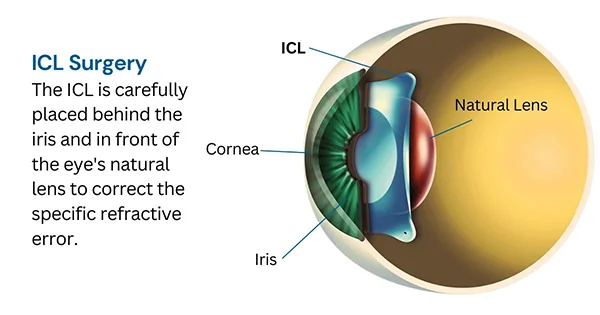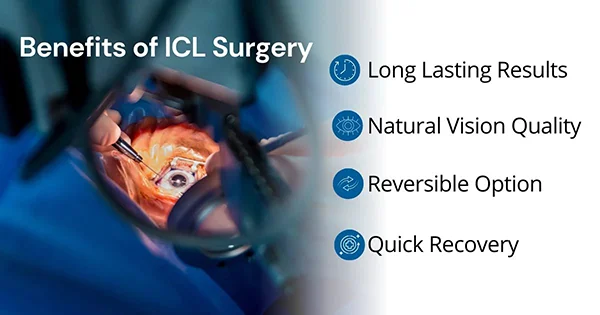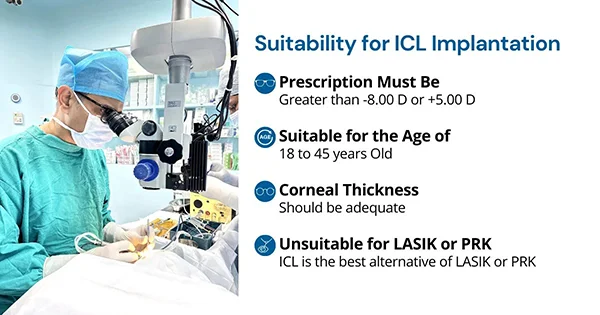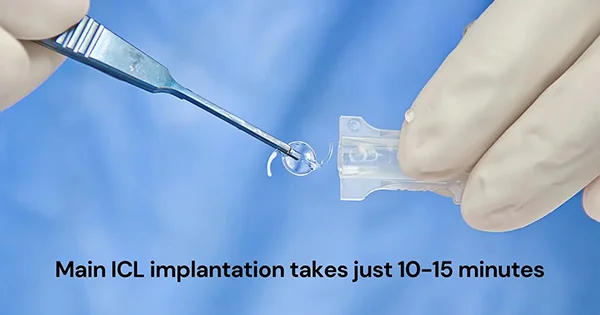ICL surgery is a revolutionary vision correction procedure that has gained immense popularity in Delhi and across the globe. It helps reducing dependency on spectacles for people facing myopia, hyperopia, and astigmatism.
This surgery does not alter the corneal flap as in LASIK. It involves implanting a micro-thin, biocompatible lens inside the eye which makes it reversible and provides long-lasting results for patients seeking clear and sharp vision.
1. What is Phakic IOL Surgery and How Does It Work?

Phakic IOL (Intraocular Lens) surgery also known as Implantable Collamer Lens (ICL) surgery, is a minimally invasive procedure that aims to correct refractive errors that cannot be effectively treated with glasses or contact lenses. The ICL, made of a collagen copolymer material, is carefully placed behind the iris and in front of the eye's natural lens to correct the patient's specific refractive error.
2. Benefits of ICL Surgery for Vision Correction
The benefits of Implantable Collamer Lens surgery are numerous and appealing to individuals seeking a reliable and permanent vision correction solution.

- High Precision Correction: This treatment provides precise and accurate vision correction, leading to enhanced visual acuity and reduced dependence on glasses or contact lenses.
- Natural Vision Quality: The ICL lens works in harmony with the eye's natural structures, allowing for excellent visual quality with minimal glare or halos, providing a more natural vision experience.
- Reversible Option: This treatment offers a reversible option for vision correction, meaning the lens can be removed or replaced if necessary in the future.
- Quick Recovery: Most patients experience a swift recovery following this treatment, allowing them to resume their daily activities within a short period.
- Long-Lasting Results: It provides long-lasting vision correction, reducing the need for frequent adjustments or replacements.
3. Are You Suitable for the Implantable Collamer Lens surgery?
This Phakic IOL surgery is an exceptional option for persons have prescription Greater than -8.00 D or +5.00 D or not suitable for LASIK. Let's explore the key factors that determine whether you are a suitable candidate for this surgery:

- Refractive Error: This surgery is ideally recommended for individuals with moderate to high degrees of myopia (nearsightedness), hyperopia (farsightedness), and astigmatism. This procedure may help if you continuously squint to see distant objects or struggle with close-up jobs.
- Age Considerations: While the ideal age range for ICL implantation is typically between 18 and 45 years old, exceptions can be made based on individual eye health and the evaluation of a skilled ophthalmologist. Ensuring that your eyes have stabilized and your refractive error remains consistent is crucial for successful outcomes.
- Stable Prescription: To be eligible for this surgery, it is essential for your refractive error to have remained stable for at least six months. Significant changes in your prescription may impact the success of the procedure and the accuracy of vision correction.
- Good General Eye Health: Patients should have overall good eye health, free from significant eye diseases or conditions such as glaucoma, cataracts, or severe dry eyes. A comprehensive eye tests will help determine the health of your eyes and your eligibility for the surgery.
- Adequate Corneal Thickness: This glass removal surgery requires sufficient corneal thickness to safely accommodate the implanted lens. If your cornea is too thin or irregular, alternative vision correction options may be considered like Scleral Contact Lenses.
- Pregnancy and Nursing: If you are pregnant or nursing, it is advisable to wait until after your pregnancy and nursing period is over before considering this surgery.
- Unsuitable for LASIK or PRK: For people who may not be suitable for LASIK or PRK due to thin corneas or other factors, ICL implantation is an excellent alternative.
4. Procedure of Implanting ICL
Implanting Phakic IOL or ICL is just a 15 minutes process but we ensure pre and post operation period to go smoother. Let's break down the procedure into easy-to-understand steps:

- Comprehensive Eye Test: Before undergoing the surgery, you'll have a thorough Pentacam Eye Test by an experienced eye specialist. This test help determine if you are a suitable candidate for the procedure and ensures that your eyes are healthy and ready for the surgery.
- Surgery prep: If you're a good candidate, the surgical team will provide you full pre-op instructions. Avoid certain medicines and wear comfortable attire on the day of the surgery.
- Administering Anesthesia: Local anaesthesia will numb your eyes during operation. You'll be awake but pain-free during operation. We never faint patients with shots.
- Creating a Small Incision: The surgeon will make a tiny incision of 2.2mm on the edge of your cornea, which is the clear front part of your eye. This incision allows the surgeon to insert the ICL lens into your eye easily.
- Inserting the ICL Lens: The foldable ICL lens, made of biocompatible material, will be gently inserted through that small incision. Once inside your eye, the lens unfolds and is carefully positioned behind your iris, the colored part of your eye. The ICL lens works in harmony with your natural lens to correct your vision.
- Closing the Incision: With the ICL lens in place, the surgeon will close the tiny incision using a self-sealing technique, eliminating the need for stitches. So, it is a painless procedure. The entire procedure typically takes less than 30 minutes per eye.
- Recovery and Follow-up: After the surgery, you'll rest for a short while at the surgical facility, and then you'll be allowed to go home. It's essential to follow the post-operative instructions which may include:
- You must be very careful for your eyes for 1st Week. Like, Should not wash your head.
- Use Goggles to protect your eyes from any irritant objects and infections.
- Avoid outdoor activities to prevent injuries.
- Use the prescribed eye drops and do not rub your eyes at all.
5. Choosing the Best ICL Surgeon and hospital in Delhi
Save Sight Centre prides itself on becoming the best ICL Implantation centre. Our competence and team of highly skilled and experienced eye specialists make us the chosen choice for ICL patients.

Precision and specialized care are crucial for your eyesight. Our cutting-edge facilities and technology guarantee the greatest treatment and results.
Here's why Save Sight Centre stands out as the best eye care centre for this Surgery:
- Our eye surgeons have vast surgery experience. They stay current to provide the most advanced and successful treatment.
- We evaluate your eyes before recommending this surgery. We customize the technique using this extensive assessment.
- We prioritize comfort and safety. We listen to your worries, answer your questions, and provide you all the information you need to choose a vision correction.
- Save Sight Centre uses the newest technology and equipment for accurate diagnostics and precision surgery. Our sophisticated technology improves the surgery safety and success.
- Each patient is unique, therefore we tailor the treatment plan to your needs. For optimal outcomes, our staff customizes personalized care.
- Our practices prioritize safety. We decrease ICL surgical hazards with strong safety standards.
- Excellent Track Record: Our consistent success and delighted patients speak volumes about our care.
Save Sight Centre offers world-class ICL implantation care. You'll receive top-notch care to protect and improve your sight. Book a consultation with us today to improve your eyesight and future.
6. Potential Risks and Complications
While, It is considered safe and highly effective, like any surgical procedure, it carries some potential risks and complications. These may include:

- Infection: Infection is a rare but possible complication following surgery. Proper post-operative care can help minimize this risk.
- Glare and Halos: Some patients may experience glare or halos around lights, especially in low-light conditions. This usually improves with time.
- Over or Under-Correction: In some cases, the ICL may result in over or under-correction of the refractive error. Your surgeon will carefully evaluate your vision and adjust the ICL accordingly.
- Cataracts: Although uncommon, this treatment can accelerate the development of cataracts. Regular eye check-ups can help monitor any changes in your eye health.
7. ICL vs. LASIK: Which Vision Correction Surgery is Right for You?
| Basis for Comparison |
ICL (Implantable Collamer Lens) |
LASIK (Laser-Assisted in Situ Keratomileusis) |
| Procedure |
Involves implanting a lens inside the eye to correct vision |
Uses a laser to reshape the cornea to correct vision |
| Suitable Candidates |
Suitable for moderate to high refractive errors, thin corneas, and those ineligible for LASIK |
Suitable for mild to moderate refractive errors and sufficient corneal thickness |
| Permanent Alteration |
Reversible, ICL lens can be removed or replaced if needed |
Permanent, reshapes the cornea, and cannot be reversed |
| Recovery Time |
Usually a longer recovery period compared to LASIK |
Faster recovery, patients can resume normal activities within a day or two |
| Risk of Complications |
Slightly higher risk of cataracts and glaucoma in the long term |
Rare risk of flap complications and dry eyes in the short term |
| Pre-operative Tests |
Requires detailed eye examination and measurement of the eye's internal structure |
Requires corneal topography and measurements |
| Post-operative Care |
Regular follow-up visits are necessary |
Fewer follow-up visits compared to ICL |
| Visual Quality |
High-quality vision with good contrast sensitivity |
Excellent visual quality and rapid visual recovery |
| Stability of Vision |
Stable vision over time |
Vision may fluctuate initially but stabilizes with time |
| Age Limit |
Suitable for a wide age range, including younger and older patients |
Typically recommended for patients above 18 years old |
Both ICL and LASIK have proven to be effective in providing improved vision, and the choice depends on various factors specific to each patient. So, you must consult the ophthalmologist to find the best method as per your eye conditions.
Frequently Asked Questions (FAQs)
FAQ 1: Who is a suitable candidate for ICL implantation?
This surgery is generally suitable for individuals with moderate to severe myopia, hyperopia, or astigmatism who are over 18 years old and have stable vision.
FAQ 2: Is ICL implantation safe?
Yes, ICL treatment is considered safe and has been performed successfully on millions of patients worldwide.
FAQ 3: What is the recovery period after the surgery?
Most patients experience a quick recovery, with vision improvement within a few days and a full recovery within a few weeks.
FAQ 4: Will I still need glasses after this surgery?
This surgery aims to reduce or eliminate the need for glasses or contact lenses for most daily activities. However, you may still need glasses for certain tasks or activities.
FAQ 5: How long does the procedure take?
The actual procedure usually takes less than 30 minutes per eye, making it a quick and convenient option for vision correction.
Remember, everyone's vision needs are different, and a consultation with an experienced ophthalmologist is the first step to better vision. Refractive errors shouldn't stop you. ICL implantation in Delhi might give you clean vision and new opportunities.





